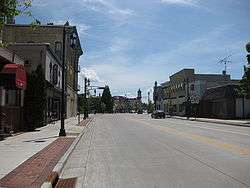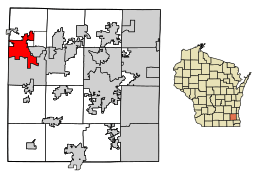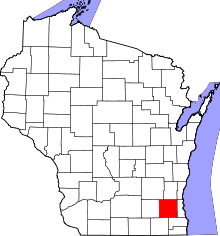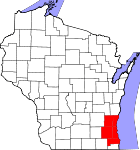Oconomowoc, Wisconsin
Oconomowoc (/oʊˈkɑːnəməˌwɔːk/ 'ohk-a-no-mo-waak') is a city in Waukesha County, Wisconsin, United States. The name was derived from Coo-no-mo-wauk, the Potawatomi term for "waterfall." The population was 15,712 at the 2010 census. The city is partially adjacent to the Town of Oconomowoc and near the village of Oconomowoc Lake, Wisconsin.
Oconomowoc | |
|---|---|
City | |
 Downtown Oconomowoc | |
 Location of Oconomowoc in Waukesha County, Wisconsin | |
| Coordinates: 43.1117°N 88.4993°W | |
| Country | |
| State | |
| County | Waukesha |
| Settled | 1837[1] |
| Government | |
| • Type | Mayor – Common Council |
| • Mayor | Robert Magnus[2] |
| Area | |
| • Total | 12.43 sq mi (32.19 km2) |
| • Land | 11.75 sq mi (30.44 km2) |
| • Water | 0.68 sq mi (1.76 km2) |
| Elevation | 823 ft (251 m) |
| Population | |
| • Total | 15,759 |
| • Estimate (2019)[5] | 16,981 |
| • Density | 1,445.07/sq mi (557.93/km2) |
| Time zone | UTC-6 (Central (CST)) |
| • Summer (DST) | UTC-5 (CDT) |
| ZIP Code | 53066 |
| Area code(s) | 262 |
| FIPS code | 55-59250 |
| Website | oconomowoc-wi.gov |
History
Before 1700, this region was inhabited by Potawatomi peoples descended from Woodland Indians known as "mound builders".[6] There are also reports that the Sauk Indian chief Black Hawk had a campsite on Oconomowoc Lake.[6]
The first white person recorded in the area was Amable (sometimes spelled "Aumable") Vicau, brother-in-law of Solomon Juneau, one of the founders of Milwaukee.[7] Vicau established a trading post in 1827.[8] White settlers soon followed, beginning in 1830.
In April 1837, New York native Charles Sheldon staked a 160-acre claim on the eastern shore of what is now Fowler Lake, registering it with the Land Bank of Milwaukee on April 21, 1837.[6] A few days later, H.W. Blanchard acquired a claim adjacent to that of Sheldon on the other side of the lake, which he later sold off to Philo Brewer. Brewer constructed what some consider to be the first residence within Oconomowoc's current legal limits, a site located at what is now 517 N. Lake Road, between La Belle and Fowler lakes.[6] The first recorded birth was that of Eliza Jane Dewey on January 19, 1840, in the lodgings above a chair factory located at 116 N. Walnut.[9] The first recorded death was that of Jerusha Foster, who died somewhere between the ages of 30 and 36 on March 19, 1841.[9] Initially buried at Zion Church point, she was eventually re-interred at Nashotah Mission.[10]
Oconomowoc was incorporated as a town in 1844, although residents had to go to Summit to get their mail until 1845.[11] Travel and communication links between the new town and nearby cities were quickly established. The Watertown Plank Road was extended to connect Oconomowoc to the nearby towns of Milwaukee, Waukesha, Pewaukee, and Watertown in 1850.[11] Such infrastructure encouraged further settlement, and by 1853 the town grew to a population of 250, with ten stores, three hotels, one gristmill, and one sawmill (both located near the present Lake Road bridge), and a schoolhouse.[12] The first passenger train from Milwaukee arrived in Oconomowoc on December 14, 1854, as part of the Milwaukee and Watertown Railroad Company's rapidly expanding Milwaukee & Mississippi line.[13]
In the 1870s, Oconomowoc started to become a summer resort town for wealthy families from the Midwest. Large houses were established around the town's lakes, particularly Oconomowoc Lake and Lac La Belle. The population grew so much that Oconomowoc incorporated as a city in 1865,[14] and by 1880 it had a population of 3,000.[6] In August 1899 a professional golf tournament hosted by the Oconomowoc Country Club was won by Harry Turpie.[15]
In 2003, Oconomowoc acquired Pabst Farms from the Town of Summit. Pabst Farms, which had previously been owned by the Pabst family, is being developed as a mixture of commercial and residential property. On April 2, 2008, a gas line exploded just west of downtown, destroying the First Baptist Church on West Wisconsin Avenue. The church, which was built in 1913, was completely destroyed, except for the frame of its bell tower, which later had to be torn down as it was at risk of collapse. The source of the explosion was an old gas line that had been capped off sometime in 1972–73; it ruptured after having been struck by a backhoe as utility work was being done on Wisconsin Avenue in preparation for reconstruction of the street.[16]
Geography and Climate
Oconomowoc is located at 43°6′31″N 88°29′49″W (43.108814, −88.497019).[17] It is located in the Lake Country area of Waukesha County. According to the United States Census Bureau, the city has a total area of 12.18 square miles (31.55 km2), of which 11.54 square miles (29.89 km2) is land and 0.64 square miles (1.66 km2) is water.[18]
| ||||||||||||||||||||||||||||||||||||||||||||||||||||||||||||||||||||||||||||||||||||||||||||||||||||||||||||||||||||||||||||
Demographics
| Historical population | |||
|---|---|---|---|
| Census | Pop. | %± | |
| 1860 | 699 | — | |
| 1870 | 1,408 | 101.4% | |
| 1880 | 2,174 | 54.4% | |
| 1890 | 2,729 | 25.5% | |
| 1900 | 2,880 | 5.5% | |
| 1910 | 3,054 | 6.0% | |
| 1920 | 3,301 | 8.1% | |
| 1930 | 4,190 | 26.9% | |
| 1940 | 4,562 | 8.9% | |
| 1950 | 5,345 | 17.2% | |
| 1960 | 6,682 | 25.0% | |
| 1970 | 8,742 | 30.8% | |
| 1980 | 9,909 | 13.3% | |
| 1990 | 10,993 | 10.9% | |
| 2000 | 12,383 | 12.6% | |
| 2010 | 15,759 | 27.3% | |
| Est. 2019 | 16,981 | [5] | 7.8% |
| U.S. Decennial Census[20] | |||
2010 census
As of the census[4] of 2010, there were 15,759 people, 6,256 households, and 4,270 families living in the city. The population density was 1,365.6 inhabitants per square mile (527.3/km2). There were 6,662 housing units at an average density of 577.3 per square mile (222.9/km2). The racial makeup of the city was 96.0% White, 0.5% African American, 0.2% Native American, 1.0% Asian, 1.1% from other races, and 1.2% from two or more races. Hispanic or Latino of any race were 3.5% of the population.
There were 6,256 households of which 34.8% had children under the age of 18 living with them, 56.7% were married couples living together, 8.1% had a female householder with no husband present, 3.5% had a male householder with no wife present, and 31.7% were non-families. 27.0% of all households were made up of individuals and 11.4% had someone living alone who was 65 years of age or older. The average household size was 2.48 and the average family size was 3.04.
The median age in the city was 38.6 years. 26.3% of residents were under the age of 18; 5.4% were between the ages of 18 and 24; 28% were from 25 to 44; 25.5% were from 45 to 64; and 14.7% were 65 years of age or older. The gender makeup of the city was 47.7% male and 52.3% female.
2000 census
As of the census[21] of 2000, there were 12,382 people, 4,968 households, and 3,293 families living in the city. The population density was 1,845.5 people per square mile (712.5/km²). There were 5,239 housing units at an average density of 780.9 per square mile (301.5/km²). The racial makeup of the city was 97.71% White, 0.31% Black or African American, 0.28% Native American, 0.53% Asian, 0.01% Pacific Islander, 0.47% from other races, and 0.69% from two or more races. About 1.65% of the population were Hispanic or Latino of any race.
Approximately 30.7% of households had children under the age of 18 living with them, 54.7% were married couples living together, 8.3% had a female householder with no husband present, and 33.7% were non-families. Some 28.6% of all households were made up of individuals and 13.5% had someone living alone who was 65 years of age or older. The average household size was 2.40 and the average family size was 2.98.
In the city, the population was spread out with 24.7% under the age of 18, 7.2% from 18 to 24, 29.5% from 25 to 44, 21.7% from 45 to 64, and 16.9% who were 65 years of age or older. The median age was 38 years. For every 100 females, there were 89.8 males. For every 100 females age 18 and over, there were 86.5 males.
The median income for a household in the city was $71,162, and the median income for a family was $89,233. Males had a median earnings of $60,998 versus $41,389 for females. The per capita income for the city was $33,418. About 1.0% of families and 2.7% of the population were below the poverty line, including 1.8% of those under age 18 and 4.9% of those age 65 or over.
Education
Oconomowoc schools are served by the Oconomowoc Area School District (OASD). Elementary schools (grades pre-K through 4th) include: Greenland Elementary, Summit Elementary, Park Lawn Elementary, Meadow View Elementary, and Ixonia Elementary. Oconomowoc has two middle schools, Silver Lake and Nature Hill Intermediate school, which serve students in 5th through 8th grades. These opened for the 2008–2009 year, replacing the older Oconomowoc Middle School. As of the 2018–2019 school year, Oconomowoc High School had 1,715 students.[22]
St. Matthew's Lutheran School is a Christian 3K-8 grade school of the Wisconsin Evangelical Lutheran Synod in Oconomowoc.[23]
Holy Trinity Lutheran School is a Christian 2K-8 grade school of the Evangelical Lutheran Synod in Oconomowoc.[24]
Transportation
Primary automobile transportation is provided by highways 16, 67, and I-94. Highway 16 runs from Pewaukee to La Crosse. The original route passes through downtown Oconomowoc; however, a bypass was built which goes around Lac La Belle to the north. Highway 67 runs from Beloit to Chillton. Interstate 94 provides access to Madison and Milwaukee.[25]
Rail
Amtrak's Empire Builder passenger train passes through, but does not stop in, Oconomowoc. The nearest Amtrak train station is Milwaukee Intermodal. Freight rail service is provided by the Canadian Pacific Railway.[26]
Bus
Bus routes 904 and 905, operated by Waukesha County Transit, has its western terminus at the Collins & Cross Parking Lot station. The service offers daily rides between Oconomowoc and Milwaukee.[27]
In popular culture
- The Wizard of Oz premiered at the Strand Theatre in Oconomowoc on August 12, 1939.[28]
La Belle Cemetery
La Belle Cemetery was the first cemetery in Oconomowoc. Originally called Henshall Place, it opened in 1851 on land that is now part of Fowler Park. It later moved to Walnut Street. When the grounds became overcrowded, Charles Sheldon donated land for a new cemetery, and in 1864 the Wisconsin Legislature approved the transfer of burials from Walnut Street to the current La Belle Cemetery grounds on Grove Street.[29]
Sister cities

Historic landmarks
Notable people
- Henry M. Ackley – Wisconsin State Senator[31]
- John M. Alberts – Wisconsin State Representative[32]
- Jill Briscoe – Evangelical author and speaker[33]
- Stuart Briscoe – Evangelical author and speaker; former senior pastor of Elmbrook Church, the largest church in Wisconsin[33]
- Timothy T. Cronin – U.S. Attorney[34]
- Dirk J. Debbink – U.S. Navy Vice Admiral, Chief of Navy Reserve[35]
- Glenn Derby – NFL player[36]
- John Derby – NFL player[37]
- Steven Foti – Wisconsin politician[38]
- Byron L. Johnson – U.S. Representative from Colorado[39]
- Frank Tenney Johnson, painter of the Old American West[40]
- Lucille Kailer – operatic soprano[41]
- John Kaiser – NFL player[42]
- Joel Kleefisch - former WISN-TV reporter and current Wisconsin state legislator
- Rebecca Kleefisch – former WISN-TV news anchor and Lieutenant Governor of Wisconsin (2011-2019); wife of Joel Kleefisch[43]
- Curtis Mann - Wisconsin State Senator and businessman[44]
- Dorothea Rudnick, embryologist[45]
- Harry G. Snyder – Wisconsin State Representative and Wisconsin Court of Appeals Judge[46]
- Andy Thompson, MLB player[47]
- Jane Wiedlin – rhythm guitarist of The Go-Go's, actress[48]
See also
Images
 Panorama
Panorama Water tower
Water tower
References
- "History". Retrieved May 9, 2009.
- "Mayor". www.oconomowoc-wi.gov. Retrieved 30 June 2020.
- "2019 U.S. Gazetteer Files". United States Census Bureau. Retrieved August 7, 2020.
- "U.S. Census website". United States Census Bureau. Retrieved 2012-11-18.
- "Population and Housing Unit Estimates". United States Census Bureau. May 24, 2020. Retrieved May 27, 2020.
- Mary A. Kane, Oconomowoc (Charleston: Arcadia Publishing, 2006), pp. 7-8.
- Wally Moyle and M.T.R., "A Junior Historian's Draper Inquiry," The Wisconsin Magazine of History 36, no. 3 (1953), 205.
- W.O. Roberts, "Early Days in Oconomowoc", Oconomowoc Free Press (October 29, 1904).
- Jean Lindsay Johnson, Illustrious Oconomowoc (Franklin Publishers, 1978), 13.
- Newnham, Mary. 1915. "Eighty Odd Years Ago: Reminiscences of Oconomowoc and Vicinity", worldmapsonline.com; accessed January 22, 2015.
- Barbara Barquist and David Barquist, "Oconomowoc," in The Summit of Oconomowoc: 150 Years of Summit Town (Summit History Group, 1987), p. 57.
- Wisconsin Historical Society, "Oconomowoc: A Brief History" (2009); accessed January 22, 2015.
- Axel Lorenzsonn, Steam & Cinders: The Advent of Railroads in Wisconsin (Wisconsin Historical Society, 2010), p. 187.
- City of Oconomowoc. "History of Oconomowoc"
- "Harry Turpie Wins the Prize". Chicago Tribune. 4 August 1899. Retrieved 26 August 2015.
- Seibel, Jacqui; Sink, Lisa; Rinard, Amy (April 3, 2008). "Blast levels church". JSOnline. Journal Sentinel. Archived from the original on June 6, 2011. Retrieved October 20, 2018.
- "US Gazetteer files: 2010, 2000, and 1990". United States Census Bureau. 2011-02-12. Retrieved 2011-04-23.
- "US Gazetteer files 2010". United States Census Bureau. Retrieved 2012-11-18.
- "NASA Earth Observations Data Set Index". NASA. Retrieved 30 January 2016.
- "Census of Population and Housing". Census.gov. Retrieved June 4, 2015.
- "U.S. Census website". United States Census Bureau. Retrieved 2008-01-31.
- "WISEdash". Wisconsin Information System for Education Data Dashboard. Retrieved June 28, 2020.
- "About Us". St. Matthew’s Evangelical Lutheran Church and School. Retrieved October 20, 2018.
- "Education". Retrieved 19 April 2020.
- "Wisconsin Highway Map" (PDF). Wisconsin DOT. Retrieved 3 November 2019.
- "Wisconsin Railroads and Harbors Map - 2019" (PDF). Wisconsin DOT. Retrieved 3 November 2019.
- "Oconomowoc Milwaukee Express". Waukesha County Transit. Retrieved 3 November 2019.
- "Beloved movie's premiere was far from L.A. limelight". Wisconsin State Journal. August 12, 2009. p. a2.
- "Chapter 164". Private and Local Acts and Charters of Incorporated Companies, Passed by the Legislature of Wisconsin, in the year 1864. Madison: William J. Park. 1864. pp. 68–71. Retrieved 26 August 2015.
- "Sister City Partnership: Dietzenbach, Germany". Oconomowoc-wi.gov. Retrieved 26 August 2015.
- PORTRAIT AND BIOGRAPHICAL RECORD OF Waukesha County, Wisconsin. Chicago: Excelsior Publishing Co. 1894. pp. 876–877. Retrieved 2015-09-24.
Henry M. Ackley+Wisconsin.
- "Alberts, John M. 1933". Wisconsin History.org. Wisconsin Historical Society. Retrieved January 10, 2012.
- "Stuart and Jill Briscoe article". Milwaukee Journal Sentinel. Archived from the original on August 25, 2010. Retrieved March 10, 2010.
- "Waukesha Daily Freeman from Waukesha, Wisconsin". Newspapers.com. Retrieved 2018-05-06.
- "Dirk J. Debbink". Navy.mil. United States Navy. Archived from the original on August 26, 2010. Retrieved August 26, 2010.
- "Glenn Derby NFL & AFL Football Statistics". Pro-Football-Reference.com. Sports Reference LLC. Archived from the original on October 11, 2009. Retrieved October 11, 2009.
- "John Derby". National Football League. Archived from the original on July 17, 2011. Retrieved February 13, 2011.
- http://www.wisconsinhistory.org/dictionary/index.asp?action=view&term_id=1899&search&term=foti
- "Johnson, Byron Lindberg Biographical Information". Biographical Directory of the United States Congress. Archived from the original on October 11, 2009. Retrieved October 11, 2009.
- "Frank Tenney Johnson". Museum of Wisconsin Art. Retrieved November 26, 2013.
- "Lucille Kailer Wins Regional Award". The Milwaukee Sentinel. February 13, 1958.
- "John Kaiser". NFL.com. NFL Enterprises LLC. Archived from the original on October 11, 2009. Retrieved October 11, 2009.
- "Who is Rebecca Kleefisch?". Archived from the original on June 11, 2011. Retrieved June 11, 2011.
Rebecca and Joel live in Oconomowoc.
- 'Curtis Mann Dies at Summit,' Milwaukee Weekly Wisconsin. March 3, 1894, pg. 1
- "Dorothea Rudnick" in Marilyn Bailey Ogilvie and Joy Dorothy Harvey, eds., The Biographical Dictionary of Women in Science (Taylor & Francis 2000): 1135. ISBN 9780415920407
- "Snyder, Harry G. 1938". Wisconsin Historical Society. Retrieved 2011-11-23.
- "Andy Thompson Stats - Baseball-Reference.com". Baseball-Reference.com. Retrieved 19 July 2018.
- "The Go-Go's Biography". Musicianguide.com. Net Industries. Archived from the original on January 2, 2010. Retrieved January 2, 2010.

